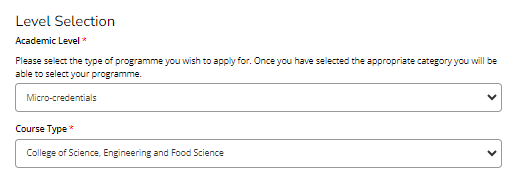| Code | AT6020 |
|---|---|
| Duration | 12 weeks |
| Teaching Mode | Part-Time. See Additional Teaching Mode Information for more info. |
| NFQ Level | Level 9 |
| Fees | 500 See Fees and Costs for full details. |
| Closing Date | 5th January 2026 |
| Venue | Blended delivery. |
| Credits | 5 |
| Start Date | 19 January 2026 |
Outline
Module Goal
The aim of this module is to enable students to assess research work and to be equipped to make decisions by using using digital, filmic, and immersive research techniques and modalities.
Module Content
- This Module will critically appraise recent and prospective issues, developments and opportunities in the digital media and new media. It will adopt experimental new modes of visualising and interacting with spatial environments and provide new ways of conjecturing on our digital futures and the possibilities inherent in applied research. With this, it will look at interactions between real world spaces and digital mediations of these spaces - facilitating the acquisition of a wide range of critical and creative skills and the possibility of:
- (a) understanding and visualising current social, ecological, economic and technological dynamics in urban settings.
- (b) finding new ways to integrate research with digital exploration.
- (c) enabling new forms of digital learning while maintaining empathy with real-world social and natural problems.
Additional Teaching Mode Information
- 4 x 1 hr(s) seminars/webinars
- 12 x 3 hr(s) laboratory sessions
100 hr(s) indpendent enquiry
Delivery: Tuesdays 14:00 - 17:00
Practicalities
Continuous Assessment - 100 marks
- Portfolio - designed and curated digital aftefact (100 marks)
Why Choose
On successful completion of this module, students should be able to:
-
Explain the benefits of digital storytelling to improve key skills and support and communicate research.
-
Recognise the potential of the digital storytelling process to support a diverse range of urban stakeholders to critically reflect upon the city
-
Identify and describe digital media concepts and principles, both immersive and non-immersive, in the context of multimedia visualisations.
-
Demonstrate applied research skills in the creation of digital media and immersive environments.
-
Demonstrate theoretical understanding of, and practical competence in the use of advanced input and output devices in a virtual environment
Requirements
To join this postgraduate micro-credential, you will ideally have as a minimum:
- A minimum of a BSc (Hons) Arch (achieved after 4-years of full-time study) or equivalent qualification in cognate discipline (e.g. Engineering, Geography, Landscape Architecture, Architectural Technology).
- However, applicants with suitable professional experience may be accepted subjected to the approval of the Programme Director under Recognition of Prior Learning (RPL).
- Beginner ability with Adobe Creative Suite (Photoshop; InDesign)
- Intermediate ability with 3D Modelling software programs such as 3DSMax, Rhino 3D, SketchUp Pro etc.
Fees and Costs
The fee for this micro-credential is €500.
How To Apply
Please select the following options during your online application (once you have created your profile)
Start a new Micro-credentials application by selecting as below

In the application level tab select the following option

, and then select the programme/module you'd like to apply for
Apply Now